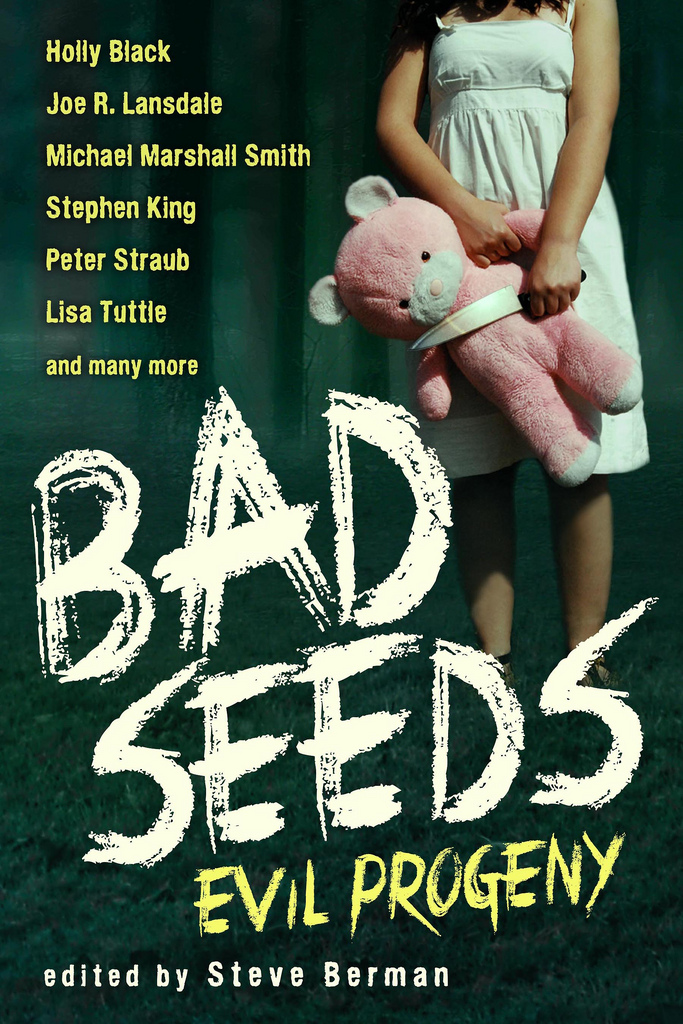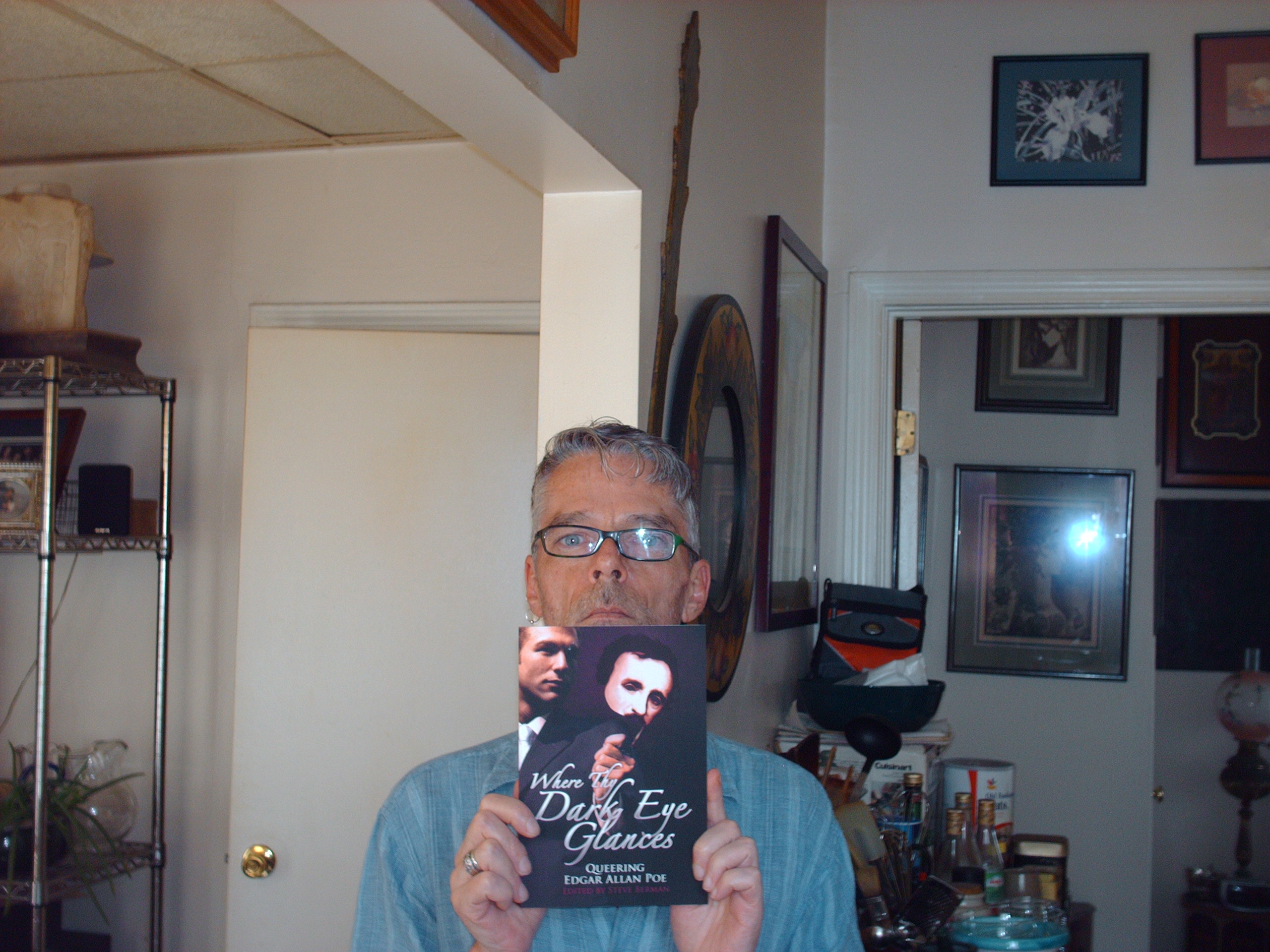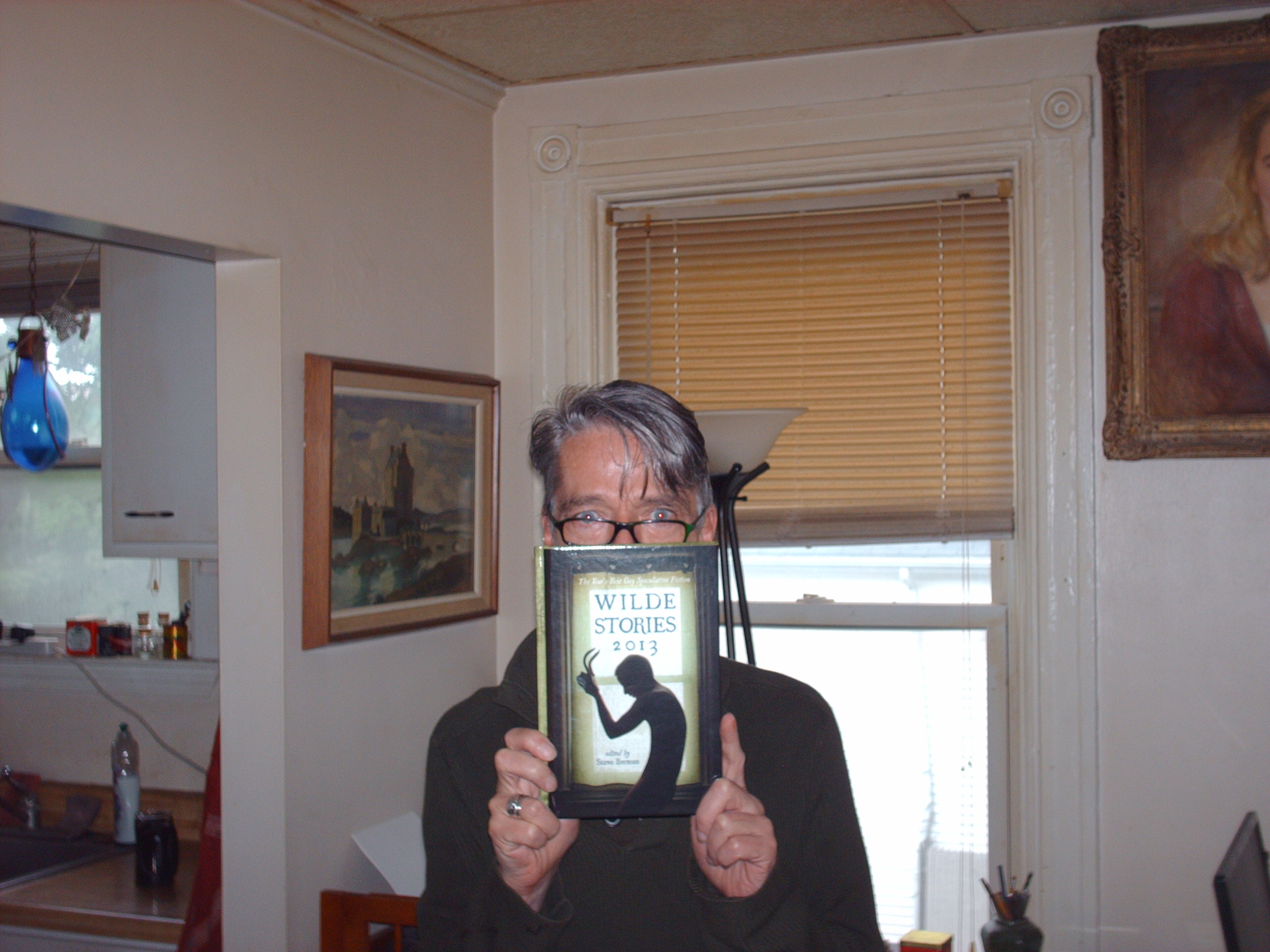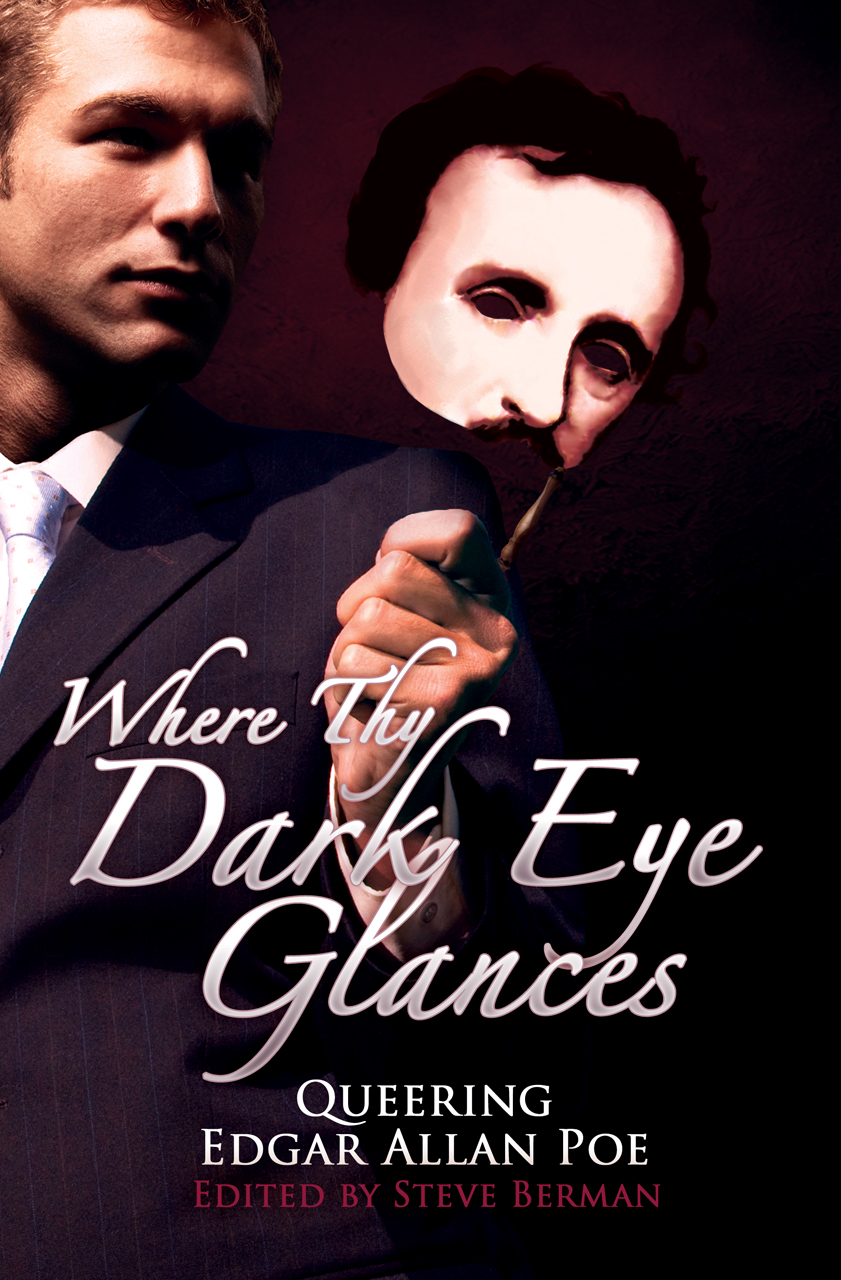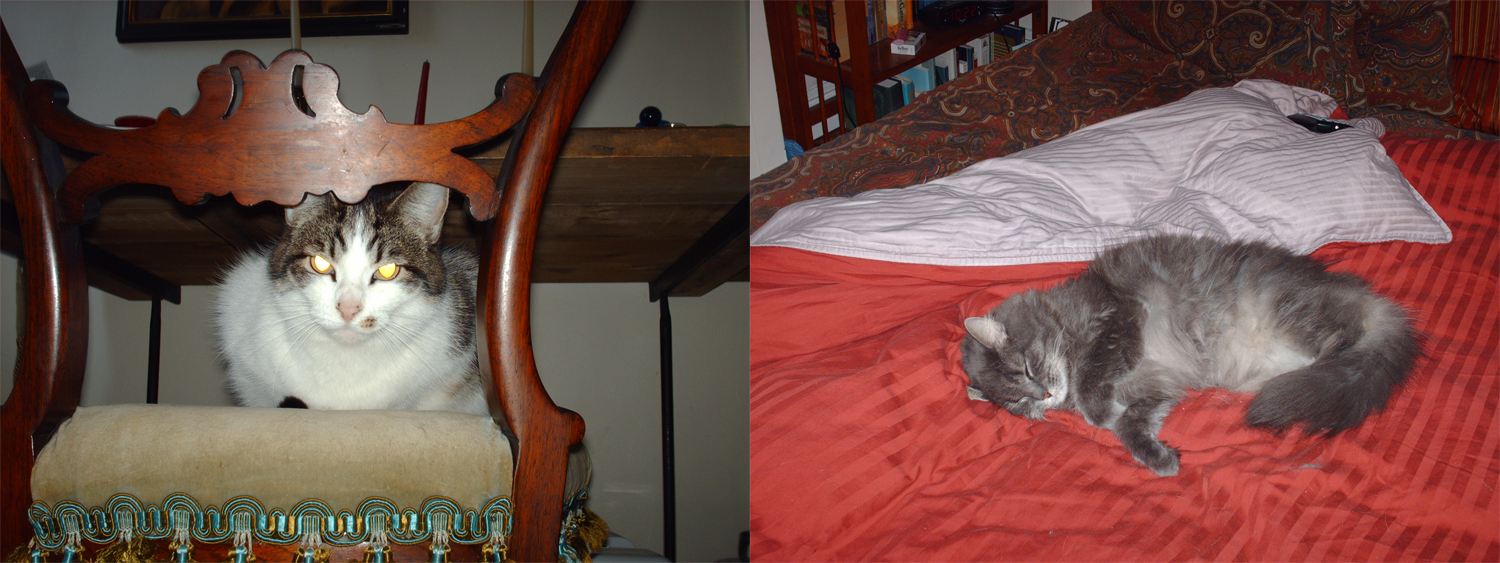In honor of my friend Steve Berman’s birthday, today, I thought I would try something I haven’t done before and am unlikely to do again: Post an original, never-before-published story here at sentenceandparagraph.com. Said story happens to be one Steve’s fond of for reasons I can’t imagine, and I am fond of partly (but not solely) because it was the first written of the tales of the subcontinent. Without further ado.
The Other Bridge
Somebody told me about the other bridge. I don’t remember who. It was a party, one of the parties my new friends insisted I attend although they invariably abandoned me without troubling themselves to present me to the host, a count or baron of the ancien régime. Everybody smoked, which I had not since university in a different country. Hired waiters in antique livery bore trays of glistening flutes filled with bitter sparkling wine from the count’s vineyards in the hinterland. In every other chamber stood a buffet of lavish abundance, either so beautiful nobody cared to spoil the arrangement or already wrecked so that the food appeared to be rotting. In one salon, a string quartet could not be heard over the grumble of conversation and disputation. In the grand ballroom, where dark oil portraits of the count’s ancestors glowered from walls festooned with plaster cornucopias spilling plaster fruit, a deejay programmed hit after hit but nobody danced.
I do remember. It does me no credit to feign otherwise. Likewise, it would do me no credit to record her name. She was a minor aristocrat, her rank indecipherable to the foreigner, not landed or landed only meagerly although her ancient jewels were very fine. In daylight hours she pretended to the civil service, a desk job that afforded her handsome clothes, the latest fashionable devices, the drugs her coterie preferred. And gifts, pretty tokens, flowers, chocolates, for the naïve exotic from the far side of the world.
Myself.
She offered me one of the glasses she had appropriated from a passing waiter, trailing her fingers across my hand as I accepted it. “Tell me,” she said, “tell me again—no, it’s noisy here—come!”
Across the ballroom I followed the artificial but very beautiful flame color of her hair, through an open door, onto a balcony. The smell of the Sja came up, choking—but not, I reflected, as sickening as Father Bodo’s where he flows through the center of my city. “I didn’t realize Count ______’s house was right on top of the river,” I murmured.
She glanced back. Raised eyebrows above her pale, pale eyes told me the count’s name was exceedingly venerable. The surprise would be if his house stood in one of the pleasant, airy, healthful parvenu quarters. They are slaves to tradition, the Sjolussenes, even now.
Disposing herself decoratively against a column of fluted marble to which clung flowering vines not fragrant enough to dispel the river’s odors, she drew a cigarette from her bag, lit it at the candlestick burning on the balustrade, and beckoned.
“I wish to hear again about your…chowas?”
“The chueie?” I made a false little laugh as I approached, not as closely as she desired. “Not mine.”
“Of course. But your country’s. Chueie? Am I saying it right?”
I was not so naïve as she—as her friends and my friends—believed. Exotic? It was half a century since people of her class had any cause besides curiosity to suffer the inconvenience of a sea or air voyage to my homeland. She was not an overly curious woman. Still, immigrants from former dominions outre-mer were scarcely uncommon in this capital of squandered empire. I had no doubt at all she daily purchased trifles and staples from vendors who resembled me as much as she resembled any of her tall, ungainly fellow citizens of the no-longer-new republic.
But the shopkeepers she patronized were common, she might tactlessly protest…if it were an argument ever conducted except in my own head. Whereas I (the image in my mind’s eye of this deliberately useless woman fluttered prettily), I, she was quite sure, outranked her.
It was possibly true. It had suited Sjolussa’s purposes very well not to dismantle the native hierarchies of annexed realms: my titles, such as they were, and my ancestry were legendary where my erstwhile lover’s were merely historical and now, by republican statute, merely decorative. When the sad, imbecile last Empress of Sjolussa, Katothtet, the Nearer Isles, and Outre-Mer was deposed and the new government renounced her dominions overseas, the apparati of state continued running like balky clockwork in Dothe, in Piq, in U, in my Aveng, in all the others. Suitable candidates of the ancient dynasties had always been ready to dispossess the Sjolussene vicereines. My family stood not within four steps of the Jade Stool in Defre, else I should be at grave risk of betrothal, but within five.
“I am quite certain,” I said, “I told you the chueie were a foolish legend, a tale to frighten stupid girls.”
“Yes,” she breathed. “Tell me. Were you frightened?”
“Of course! More frightened than many girls, I suppose.”
Enthralled, she sucked at her cigarette and breathed out smoke scented with Avengi spices, flicked a coal over the rail. I pretended to imagine I heard its hiss when it struck the Sja’s swift waters, and sipped from my glass.
“Tell me.”
I had told her of the chueie on that first occasion to signal I was not averse to her subtle courtship. Sjolussenes regard desire differently than my nation. The story had continued from the entertainment where we met, to her small, not exquisite apartment, into her bed. I had tired of her perfectly adequate lovemaking almost the moment it commenced. Already, although I found her beautiful, I realized she was relentlessly unfascinating. That was six months before, early in my residence in Sjolussa. Until this night she had appeared content with being my first seducer in her city, unjealous of the more interesting women whose affections succeeded hers, undesirous of repeating the feat. Her occasional gifts were mere trifles.
“When Defre-ua-Bodo was still a very small place, capital of nothing,” I commenced, “long before your people came to us, before we were properly a people, there was a small lake that had no name. Now it does: Kittan-e-Chuei. Now it lies within the royal precinct, but then deep in the forbidding forest, half a day’s walk from Mother Flame’s first shrine. Nobody had cause to visit it. Its waters were stagnant, unwholesome—Father Bodo provided all the water anybody needed, fresh and clean in his hurry from the mountains to the sea.
“There was a girl recently become a woman. She was meant to marry a boy, a playmate of her childhood. His family owned a bull buffalo and two cows, a year’s surplus of rice in their granary—oh, it was an advantageous match, and his mothers and fathers were kind, generous, fond of her. But the girl—shall we call her Naï?—Naï had listened too well to the wrong parts of old stories and never looked around herself at real people: she believed the fairy tale that marriage was the reward for passion.
“Naï loved another girl. Passionately. Alas for Naï, her beloved was sensible. She would have accepted her own betrothal without hesitation unless to haggle a better deal, understanding marriage to be a contract between families, corporate entities. In my country,” I said aside, for I knew it not to be true in Sjolussa, “until quite recently, fidelity, as you call it, was seldom a clause in the contract. Nobody would glance askance if Naï kept her lover after marrying the suitable boy. She would be thought peculiar if she didn’t: flighty, perhaps untrustworthy.
“Naï was peculiar. She waxed eloquent, proclaimed her unequalled love, declared she would die rather than share her beloved or be herself shared: they were one soul!
“The other girl first laughed, astonished by Naï’s ludicrous passion, then quieted. You are not sane, she said, turning away. Then, for she did truly love Naï, the sweet careless girl Naï had been, You must marry the boy. Nothing between us will change, my dear, unless it grow richer, deeper. She saw the incomprehensible horror on Naï’s face and said, her heart closing like a fist, If you choose not to marry him, I will not know you. And then she walked away.
“Betrayed, as she saw it, Naï fell weeping to the ground. Her tears made mud of the street, her cries made the air ring. People passing by glanced aside, for madness is a sad and holy thing. Busybodies, of course, ran at once to her betrothed’s mothers, more compassionate persons to Naï’s.
“Peculiar she was, mad she might be, but Naï was not entirely stupid. As she howled and wept, smeared her face with dirt, pounded her fists against unyielding earth, at a certain point she realized she had made herself a scandal that could not be lived down. The most perfect of all girls would shun her. The suitable boy of whom she had always been fond would not marry her. Her mothers and fathers would not be able to—would not care to protect her. She would be a figure of horror or of fun for the rest of her days.
“If she remained in Defre.
“So she rose to her feet and with all dignity she could muster strode away from the town and our Father Bodo, into the forest. When her mothers came to succor or scold her, she was not to be found.”
My throat was dry. Taking an effervescent sip from my flute, I glanced through lowered lashes at my audience: wide eyed, her lips prettily parted, cigarette smoldering forgotten between her fingers. “Do go on,” she pled.
I sipped again. “This was long ago, you understand. Not so long ago one wasn’t aware there were other towns, other nations in the world, but sufficiently so that one didn’t quite believe it. Only the rare, adventurous person would ever leave the place of her birth, seek out the habitations of strangers—know where to go. Naï had never been adventurous. She entered the forest blind. Once she believed herself out of sight of everybody she had ever known, she began to run.
“The dimness of the forest canopy swallowed her up. Large and small creatures that lived on the ground scattered before her noise. From the tall trees, monkeys and parrots mocked her. She felt too desolate for fear to mean much but she became more and more fearful. Was that tall, bulky shadow a bear? Could that be a leopard reclining at ease but alert on that high bough? Did tall grasses conceal a tiger? She feared, too, a great many spirits, hobgoblins, fabulous beasts it would be tedious to list.
“Hours later, when Naï stumbled upon the shore of the lake we now call Kittan-e-Chuei, there was not much left of her but sorrow, fear, exhaustion. The lake’s waters looked bad, filmed with clouds of green, blue, red-brown, and smelled worse, but she was too parched not to drink. Then she fell precipitately into sleep.
“When she woke, she believed her lover had come to comfort her. The night was dark. On the slimy surface of the lake gleamed reflections of stars like indifferent eyes. Something warm and alive was nudging her shoulder in a rude caress. She rolled over, ready to weep, forgive, be forgiven, but her lover did not embrace her. Even in darkness and the confusion of waking, Naï knew to the center of her being it was nothing human that gently pushed her again. She screamed, tried to scramble away. There was nowhere to flee but into the shallows of the lake.
“Wait, said the being.
“Naï shrieked again, trapped between unclean waters whose depth she did not know—not unusually, the girl could not swim—and the…beast. Tapirs were not meant to speak.
“Tapirs are shy, unworldly creatures. They would rather flee than attack. Naï knew this, even in her terror. But they are large, bulkier than the fattest wrestler and more agile, brutal when cornered or provoked. Naï knew that as well, and this beast was monstrous, half again the size of any natural tapir. Monstrously huge and uncanny. Wait, it said again. I am your only friend. Its lambent blue eyes glowed through the darkness. Faint light caught the white tips of its ears as they swivelled toward her, gleamed in the wet nostrils of its seeking trunk. Do not fear. I am here. Its regard steady, the animal settled back on its haunches.
“Naï was not comforted. Go away, she said weakly.
“You came to me.
“The moon rose above the trees around the lake and, most unnaturally, the monster reared up on its hind legs like a bear, pawing at the air with the blunt toes of its forefeet. Pale moonlight bathed the tapir’s vast black bulk and it changed.
“Flesh melted from its great belly. The bones of its stubby rear legs lengthened. The creature whined in a thin voice as pelvis, spine, shoulders realigned themselves to support upright carriage and its forelimbs became arms. The shape of its skull deformed, fleshy and cartilaginous features migrated and shrank. The dense pelt that had covered it melted away. In the few moments before the moon slipped entirely free of grasping branches, the giant tapir was transformed utterly. A giant man twice the size of Naï’s betrothed stood on the lakeshore.
“He shook his head as if confused, clenched and unclenched his fists, closed and opened clouded blue eyes. His skin gleamed black as coal tar, black as a tapir’s pelt, except on the rims of his slightly over large ears, white as salt. You came to me, he said again, my lovely bride.”
“Ah!” sighed my lovely listener with great satisfaction.
“And then the chuei rushed forward, swift and inescapable as a charging tapir. He grabbed cringing Naï around the waist and threw her over his shoulder. Shrieking, she beat with her fists at the saddle of salt-white skin on his back. He took no notice but strode toward the center of the lake. The unhealthy water rose to his knees, his thighs—the chuei neither halted nor slowed.
“In a matter of a few more strides, the lake lapped at his shoulders and all Naï’s effort went into keeping her head above water, flailing and coughing and screaming. The lake continued to deepen, the chuei to proceed. Tapirs, of course, are very fond of water, capable of holding their breath for a goodly period as they wander about beneath the surface, while uncanny beings such as chueie need not breathe at all unless they choose.
“Disobedient or insane girls are not so made. By the time the chuei of the lake reached his subaqueous home, his lovely bride was quite drowned. Her husband was not dismayed. He pampered Naï’s sodden corpse until her flesh dissolved into the lake’s waters. As years passed, now and then he rearranged the bones of her skeleton into newly decorative attitudes. And all along, since her body had been given neither to Mother Flame nor to the swift currents of Father Bodo, Naï’s soul was trapped in the lake: she would never in all of time reach that deep blue sea which is the sky, where the burning spirits of women and men are forever marked by their descendants on earth as stars.
“No, foolish Naï remains eternally with the chuei and all his subsequent brides, yearning always for the lover she abandoned in her pride, regretting always the husband who might have loved her sincerely, gently, instead of rutting on her like a graceless tapir whenever the desire struck.”
My onetime lover clapped with delight when I finished the tale. “Oh!” she exclaimed as I swallowed wine to soothe my throat, “oh! No wonder you were scared! Is it only girls who prefer girls who become the chueie’s brides?”
“Girls who defy their mothers’ sensible wishes. Girls who run away from home.”
As the woman bent her head to light another cigarette, a lamp within doors made her hair flare up brilliantly. Her eyes caught the light when she raised her face again. “We have a similar monster,” she breathed. “Here—in the city!”
“A tapir?” I asked, amused. Such animals are not to be found at Sjolussa’s latitudes except in the great zoological gardens.
“No,” she said, misunderstanding me. “I have never heard of it taking animal form. It preys on lost women and men.” And she began to tell me of the creature that dwells on the far side of the other bridge.
Perhaps she was simply not a storyteller: it was a confused recitation, lacking narrative or character: a haphazard collection of rumor and legend. Many centuries ago when the river was wider and the two banks of the Sja were separate nations speaking separate languages, if both nominally provinces of Katothtet’s patchwork empire, a person was exiled from the capital so far to the south and west. She did not recall his name or crime, whether he came to Góad, the town on the left bank where the Sja makes its great bend, or Pasna, on the right. She did not recall whether he was an engineer—ancient Katothtet still renowned for its engineers—or merely a visionary. He resolved the river must be bridged.
And so it was done. The logistics of such an immense undertaking were of no interest to the teller—how suspicious native governors on either side of the river were persuaded to sponsor it—how, lacking stonecutters and masons, Pasna and Góad contrived to throw a massive, unprecedented span on six arches across the swift, unforgiving Sja. For a thousand years it remained the river’s sole bridge. As Katothtet lost control of its distant provinces, then the nearer ones, finally was sacked, overrun, and reborn, Góad and Pasna prospered. The peoples and languages on either bank mingled. The separate towns became a single hybrid city, a prosperous entrepôt, Queen of the Sja. Sjolussa.
Naturally, Sjolussa fell within the eye of Owe-ejan-akhar when that monstrous conqueror, having overthrown three eastern empires, turned her attention west. Sjolussa was scarcely the Ejan’s target—grand as the town was, it was a hamlet compared to the imperial capitals she already owned—but its bridge offered the most convenient route into the rich, disunited heartlands of the subcontinent.
Refugees announced the imminent arrival of the Ejan’s hordes. Bearing the bread and salt of submission, the city’s co-princes rode half a day’s journey northeast to meet her. Gracious, she accepted their surrender and their invitation to a banquet in the Pasna prince’s palace across the river to negotiate terms: how much real tribute, how many slaves, how many lives.
It was not meant as a trap. If it had been, the Góad and Pasna princes should not have preceded the Ejan onto the bridge. It was afternoon of an uncommonly warm late-spring day. As often occurred on such days, the chill Sja had birthed a thick fog. Afoot, the co-princes of Sjolussa strode under the Góad gate, onto the bridge, and into the pearl-white mist, followed by the mounted Owe-ejan-akhar, her chief heir and commanders and one tenth of her personal guard, the Thousand Tall Riders.
At the Pasna gate waited the princes’ chamberlains and counsellors, the masters of the guilds that would bear the burden of the Ejan’s tribute. They waited, squinting into the fog rolling down the course of the river. They waited. Of the whole grand party, not a single person ever emerged from the mist.
When word of the Ejan’s vanishing reached her people, the undisciplined horde, loyal only to her, superstitious, long away from home, dissolved into tribal bands and turned east. Her minor heirs and the surviving Nine Hundred Tall Riders naturally laid waste to Góad and massacred its inhabitants. They declined to set foot or hoof on the fateful bridge. Terrible revenge taken, they too turned their horses’ heads toward the dawn and set out to carve up the Ejan’s dominions among themselves.
“You mentioned a monster,” I said. “Which preys on lost women and men.”
My flame-haired acquaintance looked up. Her eyes were glassy: the wine, the hashish and other adulterants in her cigarettes. “Come home with me,” she said, “beauty.”
I was perhaps a little drunk myself—I was flattered. But unmoved. “My dear. I must decline. I have an early appointment. It’s the inconvenient time of the month. Another night.” I made my escape.
The second week after I arrived in Sjolussa and settled into my stark but rather lovely apartment on Av. Heras on the right bank, I purchased a fashionable little motorino. The Métro was inconvenient for my purposes and I had never learned to drive an automobile. Automobiles were in any case frowned upon in the center city and prohibitively taxed. My moto had, in fact, been built in an Avengi factory: built for export, so it was slightly more powerful, slightly less noisy than the one I learned to drive on the clogged streets of Defre. Leaving the count’s house, I waited for some minutes under the porte-cochère for an attendant to fetch the moto. It was late for most citizens but not for the count’s guests. Nobody else waited with me, and the attendant appeared mildly shocked I should depart so early. I tipped him well.
Mounted at last, I drove through the count’s night-obscured gardens to the gate, where another liveried attendant bowed me through. On the narrow street overlooked on one hand by the high walls of the count’s estate, on the other by taller tenements, I thumbed the switch to initiate the navigation system. The left bank was not significantly more chaotic than the right but it was not my territory. (It bemused, almost pleased me to realize I considered any part of the imperial city mine.) The translucent display across the top of the moto’s windscreen directed me upstream.
At one time or another I had crossed and recrossed each of the city’s four bridges. The Half-Centennial, which had opened only two years earlier, was the most beautiful, a white cable-stayed harp designed by the Uvian celebrity engineer Suwin, but it was well out of my way downstream, linking the two halves of the purpose-built business district. The Jubilee, a century older, had once been beautiful, though modern eyes found its agglomeration of industrial lattice and faux-antique ornament grotesque. Av. Etz vaulted the Sja supported by an elegant steel through-arch, while Av. Gruth’s span was unremarkable concrete. As blinking dots and arrows led me on, it occurred to me that none of the extant bridges was the ancient six-arched stone span of the legend I had just heard. I had never seen a trace of it.
I was distracted. I remembered coming across a monument once in a small left-bank plaza, a plain, impassive stela inscribed to the memory of the Góad Slaughter. Another monument I had often seen without properly understanding was the Ejan Pillar, fifty meters of etched steel spiring up from an artificial islet in the river upstream of the Half-Centennial. Plaques in the park at the water’s edge called it a gift to Sjolussa from the government and people of Lararniw. Which windswept, mineral-rich, landlocked nation, I tardily recalled, claimed to be the heartland of Owe-ejan-akhar’s empires. The Ejan’s covetous eyes had never looked as far south as Aveng and our neighbors so she did not so much feature in our mythologies. Perhaps her Pillar marked the site of the old bridge from which, I had just been told, she and her Tall Riders vanished.
Perhaps not.
I steered my moto without thought according to the graphic prompts on the windscreen. There was remarkably little other traffic. I was accustomed to the uneven cobbles of Sjolussa’s surface streets, intended to keep drivers slow, cautious, alert. In the latter purpose, in my case that night, they failed. My moto and I had wobbled well across the river, bathed by its cool, odorous breeze, before it struck me none of the four bridges was cobbled. A wall of curdled fog rose before me, disturbed into eddies and whirlpools by the ancient stone bridge’s low parapets and the squat stone bollards that marked the abutments of the six arches upholding it. The motorino’s engine sputtered, failed. Still more distressing, the headlamp yellowed and went out, the navigation display evaporated.
The brakes had failed as well but I was travelling sedately and was not so incompetent I couldn’t plant both feet on the roadbed before the motorino fell over. Climbing off, I hiked up the rear wheel and kicked down the stand. Stupidly irritated, I glared at my pretty little moto. None of the four bridges I knew was within convenient walking distance of Av. Heras.
This was not any of the bridges I knew.
“Beauty,” said the river purling against the bridge’s piers.
“Beauty,” said the breeze.
“Beauty,” said the fog, something within the fog, striving to take form.
“No, really,” I said, “this will not do.”
I was not beautiful, not in Sjolussene eyes, certainly not beauty. Not even terrifically exotic. Even among the circles in which I moved there were several other expatriate Avengi of rank. There were Dothans, Piquers, who resembled me in being small, dark, more plumply voluptuous than the current subcontinental mode. There were exiles of nations I found exotic, Kyrland, Trebt, Lararniw, distant Haisn, still more distant and strange Yf. Diminished as she is, Sjollusa remains a capital of the world. “No,” I said again.
The figure resolving within the fog, about to become my flame-haired quondam seducer, hesitated. When it took another step, it had grown still taller, still more rangy and angular. It did not call me Beauty again. Instead, in a curiously muffled voice it said, “Come. Your…conveyance does not serve. I will bring you home.” Behind it loomed the indistinct silhouette of an enormous stallion.
“Thank you,” I said politely, reaching into my bag, “but I will manage quite well by myself.”
The being hesitated again.
My ’phone could find no signal—hardly surprising, I suppose, in supernatural circumstances—but its other functions appeared to be unaffected. My thumb found the camera icon, the flash illuminated the fog, the spectral horse reared back against its reins and the Tall Rider—perhaps she meant to be Owe-ejan-akhar herself—turned quickly to calm it.
The image within the ’phone’s glass faceplate was no centuries-dead conquering horse warrior of the steppes. Dead, yes.
I was not a disobedient daughter. Stubborn, surely, headstrong—no doubt my indulgent mothers and fathers simply failed ever to ask of me any action I did not care to perform. Nevertheless.
Nor had I fled Defre and Aveng. There was no scandal to be attached to my or my family’s name. Sjolussa had been my goal since childhood—that fabulous city and nation which gave my own nation and city so much yet took more, before retreating into itself like a sulky tortoise.
“This is unreasonable,” I said as Naï stepped out of the fog. “This is unfair and…unseemly.”
“Beloved,” she said, the dead playmate of school days. My first lover. My dearest friend until she chose to bewitch me. That stupid, stupid girl.
She was of Sjolussene extraction: her grandparents had chosen to stay on after divestiture although the restored government nationalized most of their holdings. Naï was raised in near poverty, circumstances made more unpleasant by bias against scions of the former colonial power. Taller than every other child our age, her hair white-gold and her skin pink, she could not disguise her ancestry. A crowd of unruly boys and girls had driven her to tears in the schoolyard with their insults when with unwarranted noblesse oblige I chased them away and dried her eyes.
As we grew up and I continued her protector, she grew beautiful in my eyes. Had she been born in Sjolussa, I expect, she would have dyed that pale hair any number of colors. I never loved her—have I loved any person?—but desire her I did. I desired several other people as well, a few more suitable than Naï, a few less, but she was nearest by.
By the time we completed our schooling, I was…not weary of her, precisely, but weary of lying to her. Like her namesake in my tale of the chuei, she would not countenance sharing me so I had no choice but to lie. There were other girls momentarily more fascinating. There was the now-and-then-delicious novelty of a handsome boy. There were lies, arguments, tears, more lies, refreshingly savage but ultimately unsatisfying lovemaking. I, of course, would matriculate at university—she, of course, would not. I travelled a distance that was short for me, nearly impossible for her, to Folau, Aveng’s second city, where I discovered, in addition to scholarship, more delicious girls, two or three fascinating boys.
In Defre, Naï pined. For myself, when I returned home on holidays, I delighted in her, her familiar ardor, for it was brief, temporary, bittersweet. And of course I lied to her.
She lied to me.
She had taken a position with a bi-national trading concern. I was not curious enough to ask what goods they traded—motorinos, perhaps—nor what her position entailed. It paid well enough, apparently: her wardrobe improved markedly. Occasionally on my visits she insisted on buying the takeaway meal, cigarettes, bottles of beer we would hurry to my private rooms. She gave me, at the terminal as I was about to board a train back to Folau, a bauble I found inexplicably exquisite when she fastened its cheap silver chain around my neck. The little wooden ball, carved and pierced and polished, tapped against my breastbone when she released it, but immediately I lifted it again to breathe in the muddled fragrances of resins, barks, dried leaves and flowers. The whole way to Folau I cradled the pomander between my palms, gazing blindly out the carriage windows past stretches of forest, past rice fields and wheat fields and corn fields, villages and larger towns, shrines, temples, distant monasteries. “Beloved,” I whispered at the countryside, seeing Naï’s blue eyes only.
At the Folau station, my chief amusement of the previous term met me. I did not recognize him when he called after me as I passed in a daze—a ridiculous happenstance for his family stood on the third step below the Jade Stool, everybody recognized him. As I generally preferred other women, he preferred other men, making us nearly a perfect match if only our ranks matched up more neatly. Put out, he called my name again and grabbed my shoulder. My hands fell from Naï’s pomander. “Oh!” I said.
“What is this ugly thing?” he asked, snapping the chain from my neck.
My eyes had turned at once to his pleasant, familiar brown eyes. I did not wish to look again at Naï’s gift now I knew what it was. “A terrible, terrible, disastrous mistake,” I said, slipping the chain from his fingers without touching its vulgar burden, and tossed the whole wicked thing off the platform onto the tracks. “I’m so sorry, I was distracted. How kind of you to meet me. Shall we go?”
He narrowed his eyes. He knew what it was as well as I now did. “Shall I—?”
“No, it’s nothing, it’s over.”
He knew as well as I we were over, as little as there was between us to be over, no tragedy of any degree. I was drowsy in his arms, content, late that night when my kindest, most tactful father ’phoned with news he understood I would find sorrowful: my old schoolmate Naï, the Sjolussene girl, had run mad, murdered the witch to whom she had apprenticed herself a year before, and drowned herself in Kittan-e-Chuei. I wept a little, not entirely for form’s sake, before asking the sweet boy to comfort me.
Now I looked from the image of Naï on my ’phone to the image of Naï which had solidified from the uncanny fog. “You are not that girl,” I said, firmly and reasonably. “She drowned herself in the lake. She chose to become the chuei’s bride. Her soul, if soul she had, cannot leave her husband’s waters.” I erased the photo.
For an instant the figure appeared worried. Then it changed again. The sweet boy I would have married happily enough if his family asked (it could never happen) gazed at me with yearning eyes. I laughed. Our circles still grazed, I had had drinks with him and his boyfriend not long before: he was no longer a boy. Since his marriage he had devoted a good deal of time, effort (and, I suspected, thaumaturgical intervention) to remaking his body in the mold of a mythic hero or mighty wrestler, nearly unrecognizable except for his eyes, very handsome, undesirable.
I laughed and raised my ’phone again as if to preserve this visitation from a pleasant memory. The thing quailed again, but I saw that I had somehow acquired a strong enough signal, so I ran quickly through the directory until I found the name I choose not to record. She chose not to answer. I left a message: “My dear. I was abrupt, I fear. Shall we meet next week? I’ve discovered a delightful Avengi bistro—allow me to buy you dinner.”
Slipping the ’phone back into my bag, I kicked the moto off its stand, grasped the handlebars, and wheeled it into the thinning, empty fog. I was entirely confident the engine would start up again as soon as I reached the far side of the other bridge. I had every intention of standing the ridiculous woman up.
Copyright © 2013 Alex Jeffers. All rights reserved. As a courtesy to the author, please do not reproduce this story without a link back to sentenceandparagraph.com.
NB: The second-written tale of the subcontinent, “Three Dead Men,” was first published in Icarus #14, Fall 2012, which may be purchased in print and electronic formats via this link. The third, “The Oily Man,” will appear in Handsome Devil: Tales of Sin and Seduction, an anthology edited by Steve Berman, to be published by Prime Books in February 2014. The fourth, fifth, umpth? Well, I haven’t finished writing them yet.

